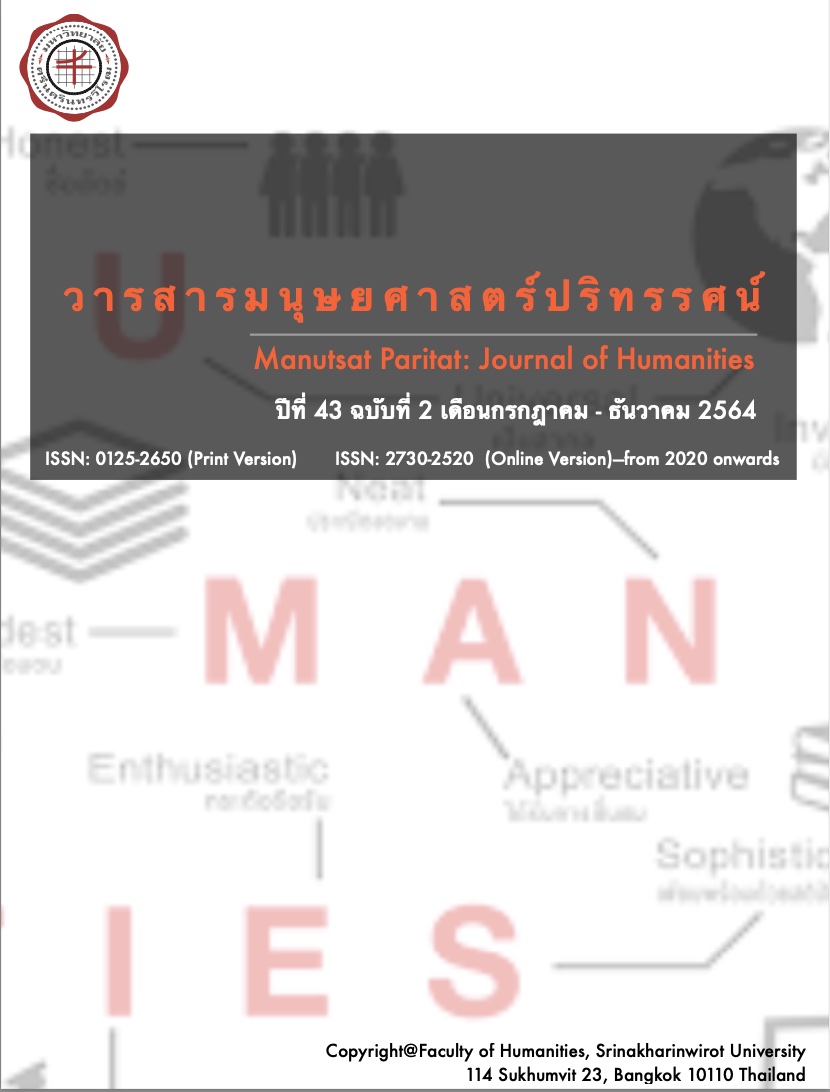Learning Resources on Sexuality, Sex Comprehensive and Proper Sexuality Learning of Psychology Students
Main Article Content
Abstract
The purpose of this research is to survey sexuality learning resources, sex comprehensive—the UNICEF Comprehensive Sexuality Education (CSE), and proper sexuality ways for teaching teenagers. Using simple sampling, one sample group of this research involves 144 undergraduates from 18-24 years of age majoring in psychology. The other sample group, selected by purposive selection, is 99 Kasetsart university students who have taken Psychology of Sexual Behavior course. The first sample group did the sexuality learning resources survey and the sex comprehensive—the UNICEF Comprehensive Sexuality Education (CSE) survey and the latter sample group did the open-ended questionnaire and online focus groups about sexuality learning resources, sexuality learning experiences that included in and out system education and responded for the proper sexuality approaching. The findings reveal that the first sample group had the high sexual comprehension in every area. The highest comprehension is about gender (91.6 %) and the least comprehension is about value rights culture with sexuality (54.7 %). Overall, the sample groups mostly received sexual information for media, friends, self-learning, school, and family, respectively. The proper sexuality ways for teaching teenagers suggest teachers should have neutral attitude, be open minded, and give students some opportunity to ask questions relating to sexuality. The teachers should be equipped with concreate teaching content and skills to create good learning atmosphere.
Article Details
Any unauthorized copying, publication, reproduction or distribution of copyrighted works appeared in Manutsat Paritat: Journal of Humanities is an infringement of the copyright owners’ rights. To authorize the copying, publication, reproduction or distribution of copyrighted works to be appeared in other printed materials or any online media, please write to MPJHthaijo@gmail.com for permission.
References
American Psychiatric Association. (2013). Diagnostic and statistical manual of mental disorders (5th ed.). Washington, DC: Author.
Astle, S., McAllister, P., Emanuels, S., Rogers, J., Toews, M., & Yazedjian, A. (2021). College students’ suggestions for improving sex education in schools beyond ‘blah blah blah condoms and STDs’. Sex Education, 21(1), 91-105. https://doi.org/10.1080/14681811.2020.1749044
Khan, T. H., & Raby, R. (2020). From missing to misdirected: young men’s experiences of sex education in Bangladesh. Sex Education, 20(6), 583-596. https://doi.org/10.1080/14681811.2019.1703177
Kaviani, C., & Nelson, A. (2021). Smartphones and the sexual behaviour of Generation Z college men in
the USA. Sex Education, 21(3), 378-385. https://doi.org/10.1080/14681811.2020.1790350
Seiler-Ramadas, R., Grabovac, I., Niederkrotenthaler, T., & Dorner, T. E. (2020). Adolescents’ Perspective on
Their Sexual Knowledge and the Role of School in Addressing Emotions in Sex Education: An Exploratory Analysis of Two School Types in Austria. The Journal of Sex Research, 57(9), 1180-1188. https://doi.org/10.1080/00224499.2020.1802644
Seiler-Ramadas, R., Mosor, E., Omara, M., Grabovac, I., Schindler, K., Niederkrotenthaler, T., & Dorner, T. E.
(2021). ‘We’re going around the subject’ improving sex education and adolescents’ awareness of sexually transmitted infections: a qualitative study. Sex Education, 21(1), 119-132. https://doi.org/10.1080/14681811.2019.1668761
UNESCO. (2009). International technical guidance on sexuality education: An
evidence-informed approach for schools, teachers and health educators.
UNICEF (2018). Review of Comprehensive Sexuality Education in Thailand. Retrieved
Unis, B. D., & Sällström, C. (2020). Adolescents’ conceptions of learning and education about sex and relationships. American Journal of Sexuality Education, 15(1), 25-52. https://doi.org/10.1080/15546128.2019.1617816
Van Keulen, H. M., Hofstetter, H., Peters, L. W. H., Meijer, S., Schutte, L., & Van Empelen, P.(2015).
Effectiveness of the Long Live Love 4 program for 13-and 14-year-old secondary school students in the Netherlands: a quasiexperimental design.
กองบรรณาธิการ วอยซ์ทีวี. (2517). ยูนิเซฟชี้ไทยอ่อนวิชาเพศศึกษา-กระทบทัศนคติเด็ก. เข้าถึงได้
จาก: https://www.voicetv.co.th/read/518344
ธนรัตน์ ทรงสมบูรณ์. (2563). เอกสารประกอบการสอนรายวิชาจิตวิทยาพฤติกรรมทางเพศ. คณะสังคมศาสตร์
มหาวิทยาลัยเกษตรศาสตร์
บุญเชียง ว., เตือนราษฎร์ ว., ฟองแก้ว ว., & กลั่นกลิ่น พ. (1). ความรู้เกี่ยวกับการติดเชื้อเอชไอวี/
เอดส์ และเจตคติต่อพฤติกรรมทางเพศ. Thai Journal of Nursing Council, 28(1), 124-137. เข้าถึงได้
จาก https://he02.tci-thaijo.org/index.php/TJONC/article/view/9025
บีบีซีไทย. (2517). โรงเรียนไทย สอนเพศศึกษา ไม่ช่วยวัยรุ่นมีทักษะเรื่องเพศ. เข้าถึงได้จาก:
https://www.bbc.com/thai/thailand-40103687
ราตรี อร่ามศิลป์, วรรณศิริ ประจันโน (2559). การสื่อสารเรื่องเพศศึกษาของพ่อแม่กับลูกวัยรุ่นใน
ครอบครัว. วารสารวิชาการสุขภาพภาคเหนือปีที่ 3 ฉบับที่ 2. หน้า 30-40
สำนักอนามัยเจริญพันธ์,(2561).สถานการณ์อนามัยการเจริญพันธุ์ในวัยรุ่นและเยาวชนปี 2561 เข้าถึงได้จาก
http://rh.anamai.moph.go.th/ewt_news.php?nid=86&filename=index


